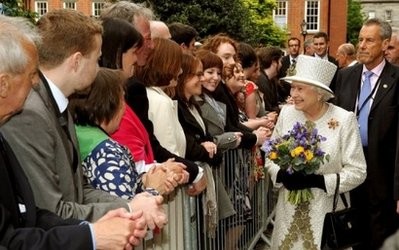DUBLIN (AFP) – Queen Elizabeth II was to visit the site of a British massacre and make a keynote speech at Dublin Castle on Wednesday, addressing old wounds on her groundbreaking state visit to the Irish Republic.
The British sovereign was due to visit Croke Park stadium, the spiritual home of Gaelic sports, where 14 people were killed in a bloody reprisal attack in 1920.
She was also to make her only major speech of the four-day trip at a state banquet held in the former seat of British power on the Emerald Isle. The tone and content is likely to set the barometer for the state of Anglo-Irish relations.

While noting the vast improvement since peace was established in British-ruled Northern Ireland, the 85-year-old is expected to tackle the tensions that have meant no British monarch set foot here in a century before her watershed visit began Tuesday.
British Foreign Secretary William Hague said that while the trip was aimed at turning a new leaf, the hosts should not expect to hear apologies for Britain's colonial rule.
"We're not glossing over the past here," Hague told reporters at Dublin Castle.
"It is about recognising those events of the past, acknowledging those events but also showing how we can move on to the future.
"That is the right way to treat it rather than to think of it in terms of apologies."
In reality, the British monarch is not a political figure and Prime Minister David Cameron has already said sorry on behalf of the government for the Bloody Sunday killings in Londonderry in 1972.
However, the queen will visit the Croke Park, scene of the Bloody Sunday of 1920 -- a gesture that would have been unthinkable for most of her reign.
Wednesday's itinerary begins on a lighter note with a trip to the Guinness brewery.
One of Ireland's top tourist destinations, the site takes visitors through the brewing process behind one of the world-famous cultural symbols of Ireland -- a pint of the black stuff.
All cameras will be waiting for the monarch to raise a pint of stout.
The royal couple then visit Government Buildings, which houses Prime Minister Enda Kenny's offices and the Department of Finance. She will meet Kenny and Foreign Affairs Minister Eamon Gilmore.
The most sensitive parts of the day begins with a visit to the Irish National War Memorial Garden, which is dedicated to the 49,400 Irish soldiers killed in World War I.
Many feel Ireland's war dead from the 1914-1918 conflict have too often been forgotten due to unease over them serving in British uniform while Ireland's independence struggle raged.
The queen and her husband Prince Philip then head to Croke Park, considered by many as a central symbol of Irish republicanism and independence from British rule.
Gilmore told AFP that the British monarch walking out on the pitch would be a "hugely symbolic" moment.
The visit to the 82,300-capacity venue, which will be closed to the public, was "part of the making of a statement about the past", he said, but would also acknowledge the key role that Gaelic games play in Irish life.
Kenny and Cameron were to hold talks before the state dinner. The banquet is the diplomatic high point of the trip.
Former Irish president Mary Robinson said there would be "significant disappointment" if the queen's speech sidestepped tough issues.
"I don't think it's appropriate for an apology but I think she could convey an understanding of the hurts that have been there and the difficult relationship," she told Britain's ITV television.
The first visit by a British monarch since independence in 1922 has required the biggest security operation in the Irish state's history.
Tuesday's first day saw Queen Elizabeth lay a wreath in honour of those who died fighting for Irish freedom from Britain in a landmark gesture. The monarch bowed her head in respect at the Garden of Remembrance and "God Save the Queen" was played in a historic moment.
But there were rowdy scenes outside where several hundred republican protesters, kept streets away, chanted and torched a British flag. Twenty-one people were arrested.
Later at Trinity College, the queen was applauded by students and staff as she visited the university, stopping to chat to well-wishers.
The 10,000-strong security force policing the visit was taking no chances amid an upsurge in violence by republican paramilitaries who oppose the Northern Ireland peace process.
A viable pipe bomb was defused outside Dublin amid a string of security alerts and a lockdown exclusion zone in in the city centre.
























